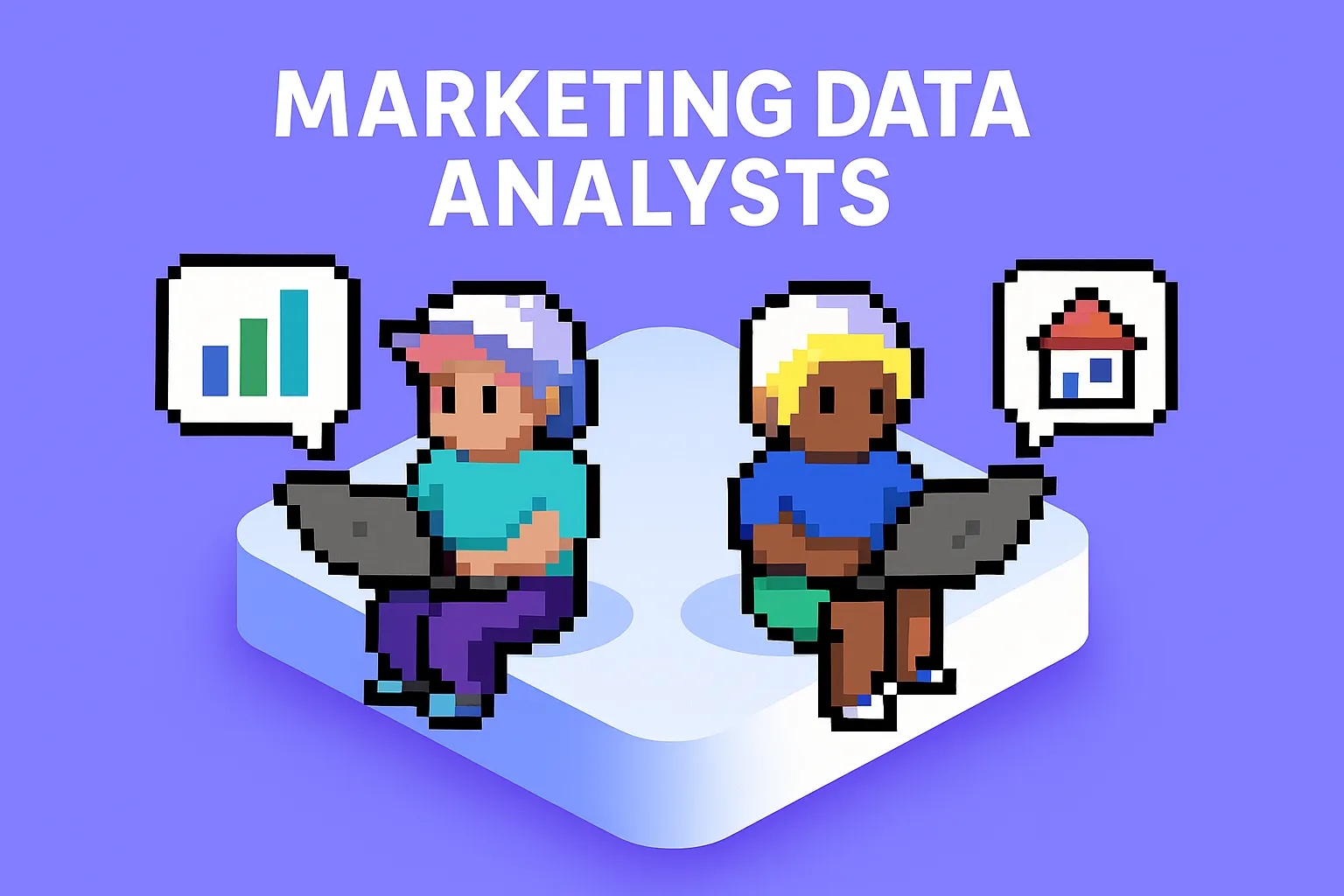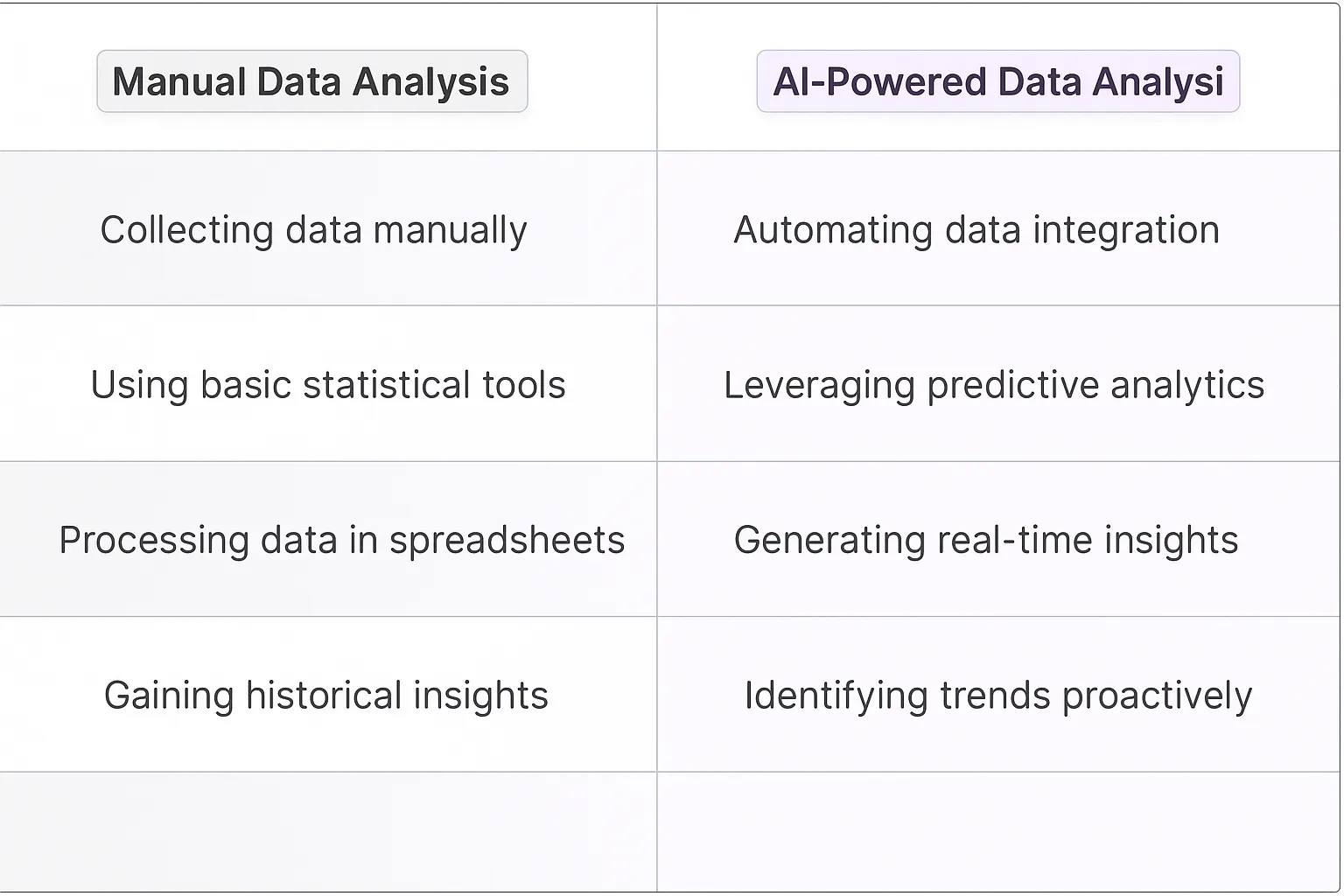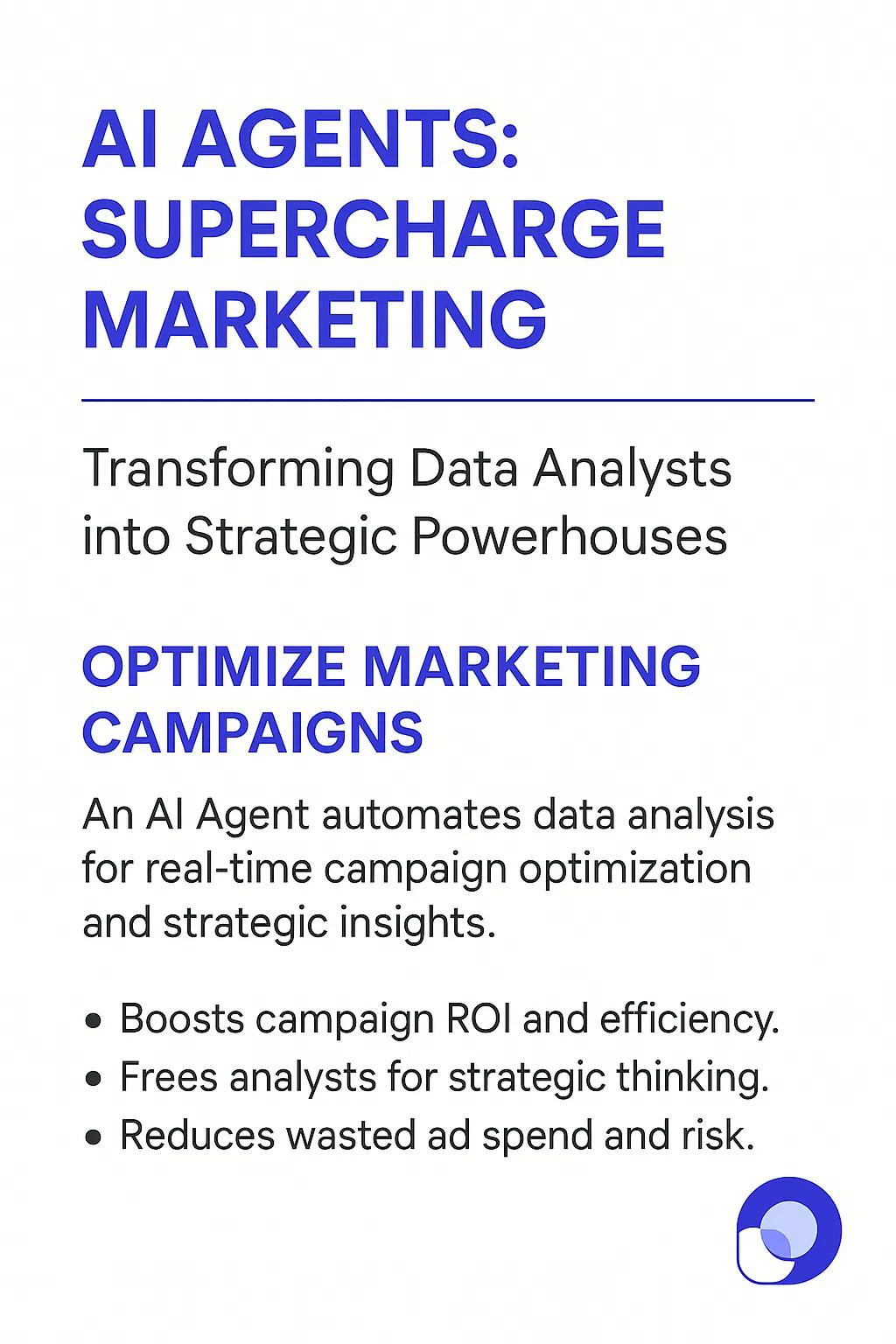Marketing Data Analysts are the unsung heroes of the digital age, wielding the power of data to shape business strategies and drive growth. They're the ones who dive deep into the ocean of information generated by marketing campaigns, customer interactions, and market trends. Their job? To surface with pearls of insight that can make or break a company's marketing efforts.
But here's the kicker - the role of a Marketing Data Analyst is evolving faster than you can say "big data". It's no longer just about crunching numbers and making pretty charts. Today's analysts are part detective, part fortune-teller, and part strategist. They're tasked with not just understanding what happened, but predicting what will happen and recommending what should happen.
The modern Business Intelligence Analyst role has expanded beyond traditional boundaries, requiring a blend of technical expertise and strategic thinking that defines the new era of data-driven marketing.

Before AI agents entered the scene, marketing data analysts were swimming in a sea of spreadsheets, wrestling with clunky dashboards, and spending countless hours manually crunching numbers. They'd rely on a mishmash of tools - from basic Excel formulas to more advanced statistical software - but the process was often slow, error-prone, and frankly, soul-crushing.
The typical workflow involved painstakingly collecting data from various sources, cleaning it up (a task that could easily eat up half a day), and then laboriously piecing together insights. It was like trying to solve a 1000-piece jigsaw puzzle with half the pieces missing and no picture on the box. Not exactly the most efficient use of a skilled analyst's time.
Enter AI agents - the digital teammates that are transforming the marketing data analyst's world. These AI-powered tools are like having a team of tireless, lightning-fast interns who never sleep and never complain about doing the grunt work.
First off, AI agents are data vacuum cleaners on steroids. They can suck up information from countless sources in seconds, saving analysts hours of mind-numbing data collection. But here's where it gets really interesting - they don't just collect data, they clean it up too. Imagine never having to deal with a messy CSV file again. It's like having a magical broom that sweeps through your data, leaving everything spotless and organized.
But the real game-changer is in the analysis itself. AI agents can spot patterns and correlations that would take a human analyst weeks to uncover. They're like having a pair of X-ray goggles for your data, revealing hidden insights and trends that were previously invisible. This isn't just about speed - it's about uncovering completely new avenues for marketing strategy that human analysts might never have thought to explore.
And let's talk about predictive analytics. AI agents are turning marketing data analysts into fortune-tellers. These digital teammates can crunch historical data and current trends to forecast future outcomes with scary accuracy. It's like having a crystal ball, but one that's powered by algorithms instead of mystical energy.
But here's the kicker - AI agents aren't replacing marketing data analysts. They're supercharging them. By taking care of the time-consuming, repetitive tasks, AI agents free up analysts to focus on what humans do best - creative problem-solving and strategic thinking. It's like giving analysts a jetpack, propelling them to new heights of productivity and insight.
In the end, AI agents are transforming marketing data analysts from number crunchers into strategic powerhouses. They're elevating the role from "person who makes pretty charts" to "indispensable source of business-critical insights". And in a world where data is the new oil, that's a pretty sweet position to be in.

Marketing data analysts are the unsung heroes of growth, sifting through mountains of data to uncover insights that drive business decisions. AI agents are poised to become their indispensable digital teammates, augmenting their capabilities and unlocking new levels of productivity. Here's how these AI-powered allies can revolutionize the day-to-day processes of marketing data analysts:
Beyond these broader processes, AI agents can tackle specific tasks that typically consume a significant portion of a marketing data analyst's time and mental bandwidth:
The integration of AI agents into the marketing data analyst's toolkit isn't just about automation—it's about amplification. These digital teammates can handle the heavy lifting of data processing and routine analysis, allowing human analysts to focus on strategy, creativity, and the nuanced interpretation of results that machines still struggle with.
As these AI agents become more sophisticated, we'll likely see a shift in the role of marketing data analysts. They'll evolve from number crunchers to strategic advisors, leveraging AI-generated insights to guide high-level business decisions. The most successful analysts will be those who can effectively collaborate with their AI counterparts, combining machine precision with human intuition to drive unprecedented growth.
The future of marketing data analysis is a symbiosis of human and artificial intelligence. It's not about replacing analysts, but rather equipping them with superpowers. As these AI agents continue to evolve, they'll unlock new possibilities in data analysis, enabling marketers to operate at a scale and level of precision that was previously unimaginable. The companies that embrace this human-AI collaboration will have a significant competitive advantage in the data-driven marketing landscape of tomorrow.

Marketing data analyst AI agents are reshaping how businesses interpret and act on consumer insights. These digital teammates aren't just number crunchers; they're becoming indispensable partners in crafting data-driven strategies across various sectors. Let's dive into some concrete examples of how these AI agents are making waves in different industries, transforming raw data into actionable intelligence that drives growth and innovation.
From e-commerce giants fine-tuning their recommendation engines to healthcare providers optimizing patient outreach, these AI-powered analysts are proving their worth by uncovering patterns and opportunities that human analysts might overlook. They're not replacing human expertise but amplifying it, allowing marketing teams to make decisions with unprecedented speed and precision.
As we explore these use cases, you'll see how marketing data analyst AI agents are becoming the secret weapon for companies looking to stay ahead in the data-driven marketplace. They're turning the art of marketing into a science, without losing the creative edge that defines great campaigns. The Marketing Analytics Director role is evolving to leverage these powerful AI capabilities for strategic advantage.
The e-commerce industry is a goldmine of data, but extracting actionable insights can be like finding a needle in a haystack. Enter Marketing Data Analyst AI agents – the digital teammates that are transforming how online retailers understand and engage their customers.
Take a rapidly growing direct-to-consumer (D2C) fashion brand. They're drowning in data from multiple touchpoints: website interactions, social media engagement, email campaigns, and purchase history. Traditionally, a team of analysts would spend weeks crunching numbers, often missing critical patterns or time-sensitive opportunities.
With AI-powered Marketing Data Analyst agents, this D2C brand can now perform real-time cohort analysis, identifying which customer segments are most likely to convert based on their browsing behavior and past purchases. The AI doesn't just spot trends; it uncovers hidden correlations that human analysts might overlook.
For instance, the AI agent might discover that customers who view product videos are 30% more likely to make a purchase, but only if they receive a follow-up email within 24 hours. It could also identify that a specific color combination in Instagram ads leads to a 15% increase in click-through rates for millennial customers.
These AI agents don't just crunch numbers; they provide context and actionable recommendations. They might suggest dynamically adjusting product recommendations on the website based on real-time inventory levels and individual user behavior. Or they could recommend optimizing ad spend by shifting budget to high-performing channels during specific times of day.
The result? The D2C brand can now make data-driven decisions at the speed of e-commerce. They're able to personalize marketing efforts at scale, optimize inventory management, and predict future trends with uncanny accuracy. It's not just about analyzing past performance; it's about shaping future strategy with AI-powered foresight.
In the cutthroat world of e-commerce, where margins are thin and competition is fierce, these AI-powered Marketing Data Analyst agents aren't just nice to have – they're becoming essential for survival and growth. They're turning data into a competitive advantage, helping brands not just react to market changes, but anticipate and shape them. Advanced Customer Behavior Analysis capabilities enable these brands to understand their customers at an unprecedented level of detail.
The real estate industry is ripe for disruption, and AI-powered Marketing Data Analyst agents are leading the charge. These digital teammates are transforming how property investors, developers, and agencies make decisions in a market where timing and location are everything.
Consider a mid-sized real estate investment firm looking to expand its portfolio. Traditionally, they'd rely on a mix of gut instinct, historical data, and manual market research. Now, with AI agents, they're playing a whole new ball game.
These AI agents are crunching vast amounts of data from multiple sources: property listings, demographic shifts, economic indicators, urban development plans, and even social media sentiment. But here's where it gets interesting - they're not just aggregating data, they're uncovering hidden patterns and predicting future trends with startling accuracy.
For instance, the AI might identify an upcoming neighborhood gentrification trend years before it becomes obvious to human analysts. It could spot a correlation between new tech startup office locations and subsequent spikes in nearby residential property values. Or it might predict how climate change-related regulations will impact property prices in coastal areas over the next decade.
But it's not just about big-picture trends. These AI agents are getting granular. They're analyzing the impact of subtle factors like the proximity to trendy coffee shops on rental yields, or how the announcement of a new public transport line affects property appreciation rates block by block.
The real magic happens when these insights are translated into actionable strategies. The AI doesn't just say "buy here" - it provides a nuanced analysis of potential risks and returns, suggests optimal timing for transactions, and even recommends specific property types that are likely to outperform the market.
For our real estate investment firm, this means they can now confidently enter new markets, optimize their existing portfolio, and even create tailored investment products for their clients. They're no longer just reacting to market trends - they're anticipating and capitalizing on them before their competitors even notice.
This AI-driven approach is leveling the playing field. Smaller firms can now compete with industry giants, armed with insights that were previously accessible only to those with massive research budgets. It's democratizing access to sophisticated market analysis, potentially reshaping the entire landscape of real estate investment.
In an industry often criticized for its opacity and inefficiency, these AI-powered Marketing Data Analyst agents are bringing unprecedented transparency and dynamism. They're not just changing how we analyze real estate markets - they're fundamentally altering how we perceive and interact with the built environment around us. The role of the Market Research Analyst is being transformed by these powerful AI capabilities, enabling deeper insights into market dynamics.
Advanced data analysis techniques are now accessible to firms of all sizes, democratizing sophisticated market intelligence that was once the exclusive domain of large corporations.
Implementing a Marketing Data Analyst AI Agent isn't a walk in the park. It's more like trying to teach a robot to salsa dance while juggling flaming torches. The first hurdle? Data integration. Your AI needs to slurp up data from a smorgasbord of sources - CRMs, social media platforms, web analytics, and that dusty Excel sheet Bob from accounting swears by. It's a data buffet, and your AI needs to digest it all without getting indigestion.
Then there's the machine learning model itself. It's not just about throwing algorithms at the wall and seeing what sticks. You need a model that can handle the nuances of marketing data - seasonality, campaign effects, and those pesky outliers that make your graphs look like modern art. And let's not forget about scalability. As your marketing efforts grow, your AI needs to keep up without breaking a sweat or your budget.
On the operational side, things get even spicier. First up: the human factor. Your marketing team might view this AI as the office Terminator, here to steal their jobs and possibly their lunch. You need to navigate this minefield carefully, positioning the AI as a digital teammate rather than a replacement.
Then there's the question of trust. Can your team trust the AI's insights? It's one thing for an AI to tell you that your latest campaign is tanking; it's another for your team to believe it and act on that information. You need to build a culture of data-driven decision making, where the AI's insights are valued but not blindly followed.
Lastly, there's the ever-present challenge of ROI. Implementing an AI isn't cheap, and CFOs aren't known for their patience. You need to show tangible results, fast. This means setting clear KPIs, tracking them religiously, and being ready to pivot if things aren't working out. It's a high-stakes game of show and tell, where the prize is continued investment in your AI-powered future.
The marriage of Marketing Data Analysts and AI agents is not just a trend - it's a seismic shift in how businesses leverage data for growth. These digital teammates are unlocking new levels of insight and prediction, transforming analysts from number crunchers into strategic powerhouses.
But let's be real - this isn't a plug-and-play solution. Implementing AI agents comes with its own set of challenges, from data integration headaches to the need for a cultural shift in how organizations view and use data. It's a journey that requires investment, patience, and a willingness to embrace change.
Yet, for those who get it right, the payoff is massive. We're talking about the ability to predict market trends before they happen, personalize customer experiences at scale, and make decisions with a level of confidence that was previously unimaginable.
The future of marketing data analysis is here, and it's powered by AI. Those who embrace this human-AI collaboration will find themselves not just keeping up with the market, but actively shaping it. In the end, it's not about replacing human insight with artificial intelligence - it's about creating a symbiosis that elevates both. Welcome to the new era of data-driven marketing, where the possibilities are as limitless as the data itself.